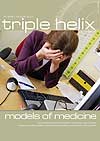Mark Lee: supporting medical students in Armenia
Mark is a palliative care consultant in Newcastle .
'It all started at an ICMDA conference in 2001, when some medical students asked my prayer partner Chris Richards to run a summer camp in Armenia and he asked me to help. I didn't even know where Armenia was but agreed and have been going every year since. We run a six day camp each summer which mixes Bible teaching, clinical cases and ethical discussions. The students love the interactive sessions – so different from the didactic teaching they get.
Although Armenia is a Christian country, it's all about tradition and religion rather than personal faith. We place great importance on doctors supporting students, and are trying to replicate that with the Armenian Christian Medical Association. I was so encouraged to meet at a conference a doctor who had been a student on one of our camps years before. Over the years you plant seeds and often don't see fruit, but here was a young man, standing for Christ in the medical profession.
CMF in Newcastle has supported the camps with regular prayer meetings and giving. Different members have gone to lead – usually four or five. For a couple of years we also ran a camp in Georgia where they are desperate for support. One student said to me 'I have prayed for this for two years. I can't believe you've come!' But there aren't enough of us to run camps in both countries. We have so many resources – I'd love to see others taking up this opportunity to encourage our brothers and sisters in countries where they have so little support.'
David Curnock: hospital link
David is a paediatrician, now retired from the NHS but busy in Ethiopia and Tanzania.
Hospital links are a wonderful way of contributing. I have been involved with a partnership between the university hospitals of Nottingham and Jimma, Ethiopia, going for 17 years. It was set up through the Tropical Health Education Trust (THET - www.thet.org), which develops and supports hospital links to improve health services in developing countries. The link involves short visits in both directions. Our trips follow requests made by our Ethiopian colleagues for teaching on a particular topic or help in a particular area. My role has been teaching neonatal care and resuscitation, but the link involves the whole hospital so all sorts have been out – radiographers, physios, librarians, laundry managers, human resources and medical records staff. Our Chief Executive went and returned enthusiastic to develop the link, not just for altruistic reasons but because he saw how much it contributes to personal and professional development in Nottingham. Lasting friendships are formed even though the visits are short – the link is a long term relationship.
The Department for International Development has recently created a new £5 million Health Systems Partnership Fund to give grants to support links. So now is a good time to get involved! Find out from THET about your nearest link, or explore with colleagues setting up a link through THET for your own hospital.
Stephen Miller: mentoring pioneers in palliative care
Stephen is a GP with a special interest in palliative care.
I had always wanted to work in the developing world – I looked at possibilities many years ago but it didn't fit with family commitments, so I put the idea on the back burner and plunged into general practice. Twenty-five years later, with children grown up, the opportunity arose through a church link with a mission hospital in Muheza, Tanzania. My wife and I visited and found they were developing a palliative care programme and needed mentors – here was an opportunity for me.
I spent three months working with local health professionals and volunteers, teaching palliative care in the classroom and at the bedside. Together we saw patients in clinics, on wards, and in the community, discussing cases and working out how best to provide holistic palliative care. This was a steep learning curve, as medicine in Africa is very different from medicine in the urban Midlands! Local clinicians will continue the work, and I will keep in touch by email and text. I hope to visit again in the future – possibly longer term.
It was a fantastic experience – a privilege to be part of a local team and a challenge to rely on my clinical skills. Resources were very few but nonetheless we could make a real difference. I remember seeing a four year old girl in severe pain from a neuroblastoma, whose parents wanted her home to die. Teaching her family how to use morphine transformed the whole situation, and the skills the team are learning will do the same for many more.
































